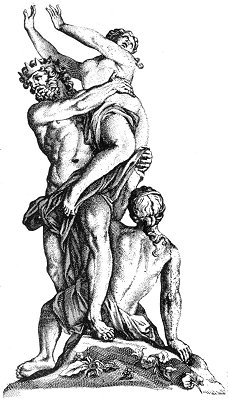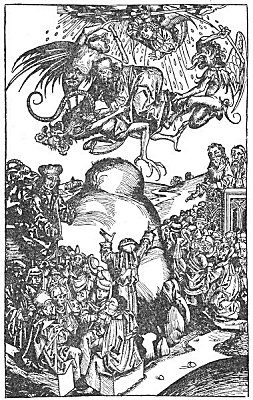p. 502
Ninth Part of the Code of the Illuminees.
By the great importance which the Sect places in the last mysteries of Illuminism, and the many precautions it has taken to conceal them from the public view, I am compelled to begin this chapter with candidly declaring, that every attempt to discover the original text of this part of the Code has been fruitless. Such an avowal, however, should not disconcert the reader. Though the real text may be wanting, we have abundant matter to supply its place. We have Weishaupt’s familiar correspondence; we are in possession of the letters of many of the adepts who enthusiastically admired them; and the avowals are still extant of other adepts, who indignantly beheld such abominations. Our judgement will be guided by laws laid down by Weishaupt himself; and the famous apology of this monstrous legislator will teach us how to appreciate them. Such materials are more than sufficient to supply the deficiency of the literal text. It is true, that the crafty cant and affected enthusiasm of the Hierophant will be wanting; but the substance of his declamation, the extent and monstrosity of his ultimate plots will lose nothing of their evidence. Let us begin then by attending to their author, and from him receive our first impressions.
Weishaupt, when writing to Zwack, his incomparable man, and speaking of the degree of Epopt, wherein impiety and rebellion seem to have strained every nerve to disseminate their venemous principles against church and state, says, “One might be tempted to think that this degree was the last and the most sublime: I have, nevertheless, three more of infinitely greater importance, which I reserve for our Grand Mysteries. But these I keep at home, and only show them to the Areopagites, or to a few other brethren the most distinguished for their merit and their services.—Were you here, I would admit you to my degree, for you are worthy of it—But I never suffer it to go out of my hands. It is of too serious an import; it is the key of the ancient and modern, the religious and political history of the universe.”
“That I may keep our provinces in due subordination, I will take care to have only three copies of this degree in all Germany; that is to say, one in each Inspection.” He soon after writes again to the same adept: “I have
p. 503
composed four more degrees above that of Regent; and with respect to these four, even the lowest of them, our degree of Priest will be but child’s play”—Wogegen den schlechesten der priester grad kinder spiel seyn soll. 1
Before we draw any conclusion toward forming our judgment, let me recall to the mind of the reader those letters wherein Weishaupt declares, that every degree shall be an apprenticeship for the next, a sort of Noviciate for the higher degrees. That these degrees were always to be in crescendo; in fine, that in the last class of the mysteries a perfect statement of the maxims and polity of Illuminism was to be given. Und am ende folgt die totale einsicht in die politic and maximen des ordens. 2 After such letters, the text of these mysteries is scarcely necessary. I know that these degrees were reduced to two for the last class of the mysteries; I know, from the agreement made by the founder and his intimate adepts, that the first was the Mage, or Philosopher; the other, the Man King. 3 I will start from these data, and shall not hesitate to say, that this monster of impiety and of wickedness imposes on himself when he speaks of degrees infinitely more important for the higher mysteries, or when he pretends that those of Epopt and Regent are but puerile in comparison with those which he reserves for his intimate adepts. His execrable pride may flatter him with surpassing even the devils themselves, in his wicked inventions for sending forth the pestiferous blast; but their combined efforts could not suggest more hideous plots than those in which Weishaupt glories when calling them his lesser mysteries.—What! the vow of annihilating every idea of religion, even to the very name of a God; the plan for overthrowing every government, even to the obliteration of every vestige of laws, authority, or civil society; the wish of destroying our arts and sciences, our towns, and even villages, that they may realize their systems of Equality and Liberty; the desire of exterminating the greater part of human nature, to work the triumph of their vagabond clans, over the remaining part of mankind. These vows and wishes, these plots and plans, have already appeared in the lesser mysteries, and his adepts must have been as stupid as he wishes them to be impious and wicked, if they have not seen through the web that veils from their sight the baleful abyss. And, after all, it is not the object or the substance of their plots which is thus slightly veiled; the terms alone are concealed. There only remains to say, that all religion shall be destroyed for the adoption of Atheism; every constitution, whether Monarchical or Republican, shall be overthrown in favour of absolute Independence; property shall be annihilated; science and arts shall be suppressed; towns, houses, and fixed habitations, reduced to ashes, for the reestablishment of the roaming and savage life, which the hypocrite, in his cant, calls the patriarchal life. Such are the terms; and the scroll of this hideous pantomime needed only to be unrolled, to tell the names of those who were to appear on the gloomy stage of the last mysteries. The adept had long since inhaled the deleterious air with which Weishaupt had spared no pains to surround him; and could he nauseate this, or turn away from these disastrous machinations, the gates of the mysterious pit were shut against him. At such a sight nature shudders—The reader will cry out, None but monsters could

Moe is the founder of GnosticWarrior.com. He is a father, husband, author, martial arts black belt, and an expert in Gnosticism, the occult, and esotericism.



